Unit 5 Our school life>Topic 1 Section B课件+嵌入音频 (共45张PPT)
文档属性
| 名称 | Unit 5 Our school life>Topic 1 Section B课件+嵌入音频 (共45张PPT) |  | |
| 格式 | pptx | ||
| 文件大小 | 12.2MB | ||
| 资源类型 | 教案 | ||
| 版本资源 | 仁爱科普版 | ||
| 科目 | 英语 | ||
| 更新时间 | 2023-07-02 09:18:31 | ||
图片预览

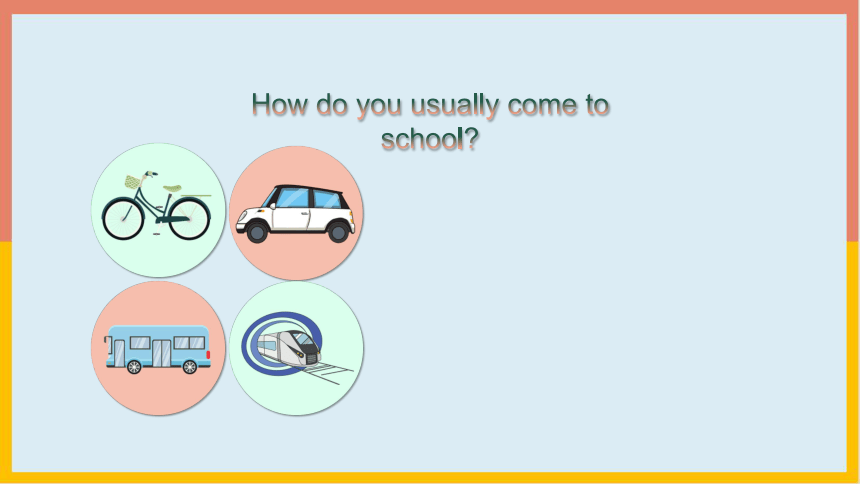
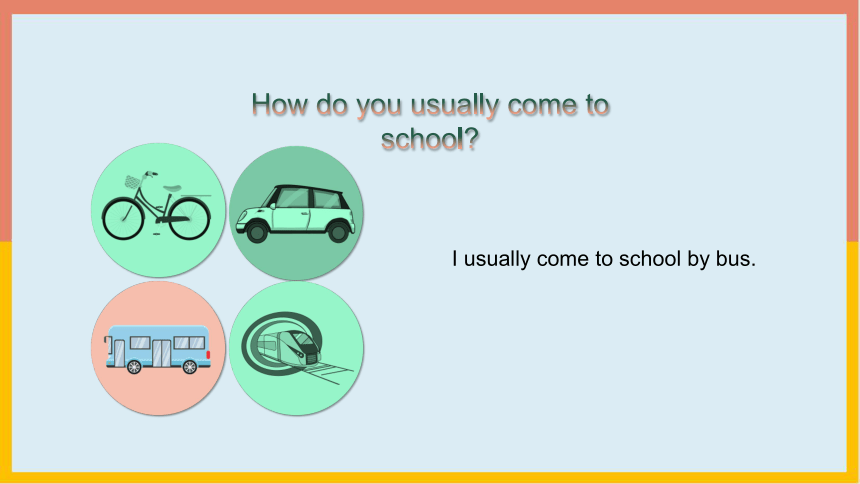
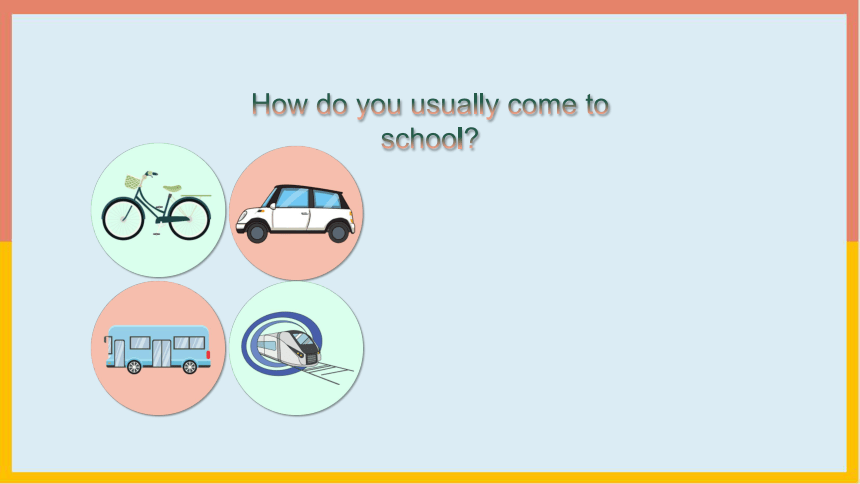
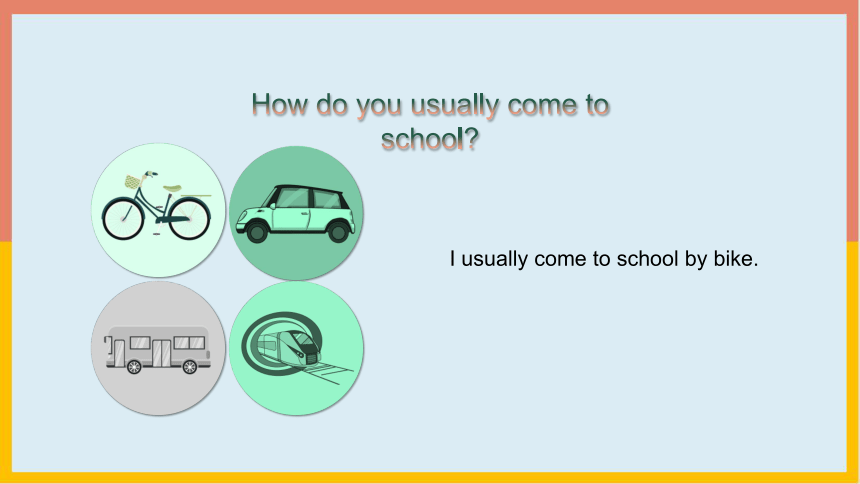
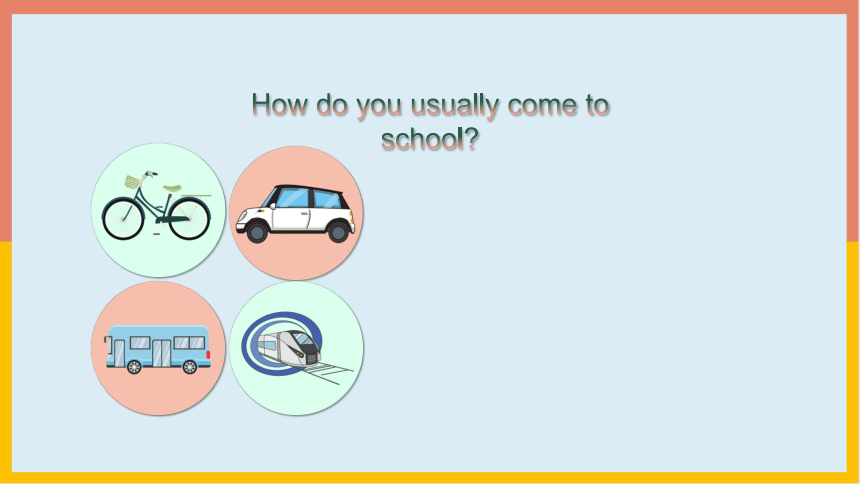
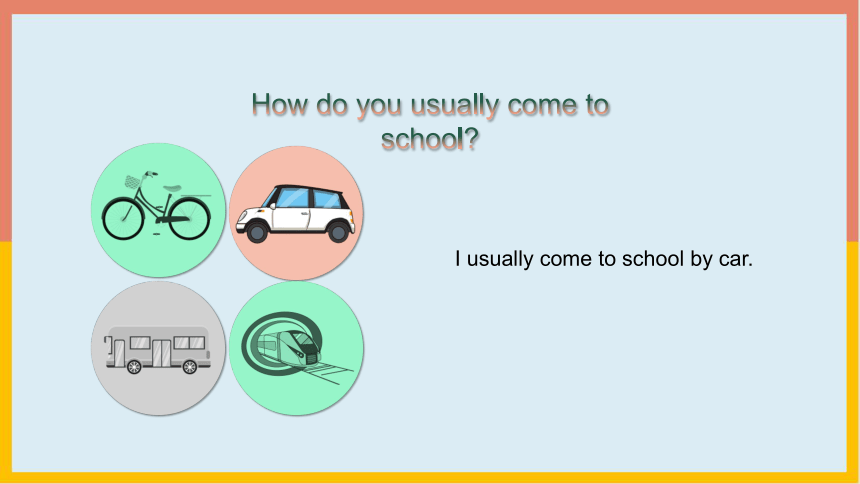
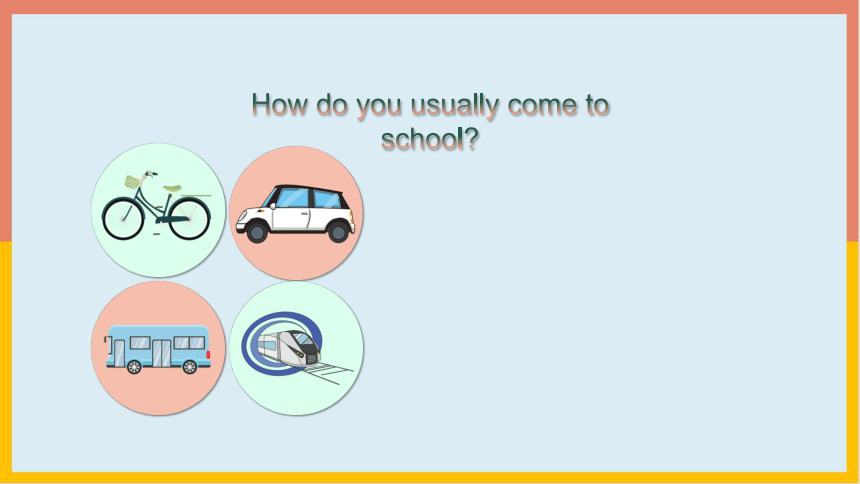
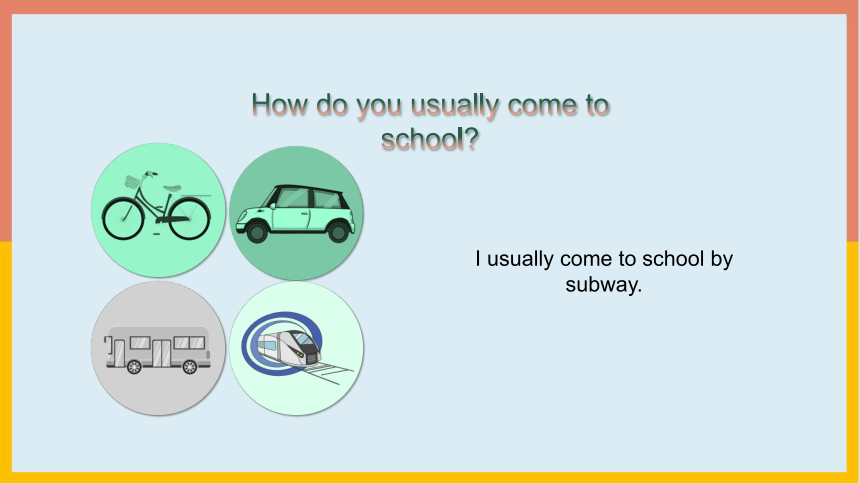
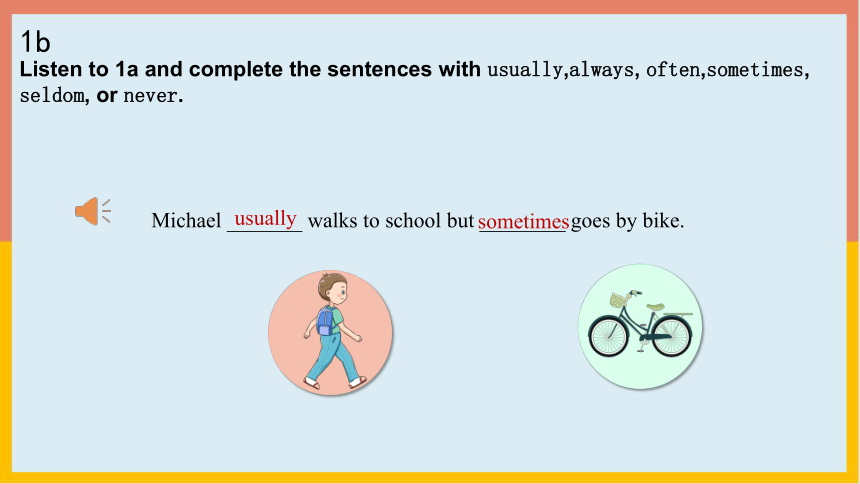
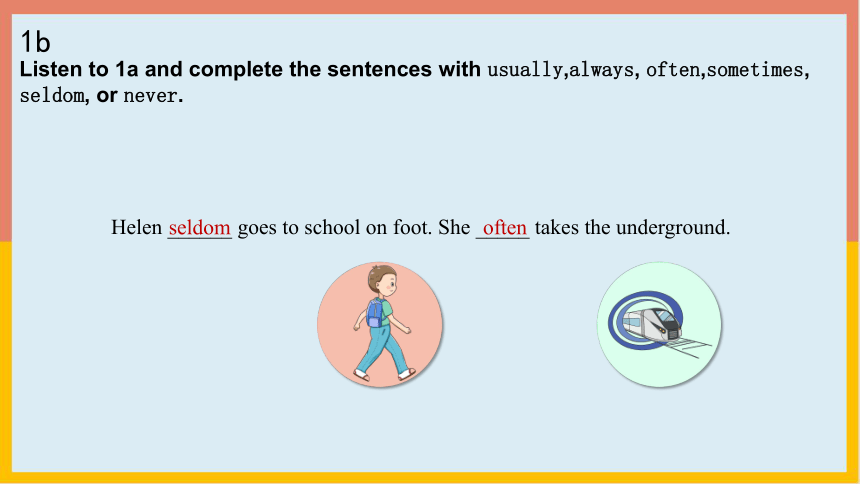
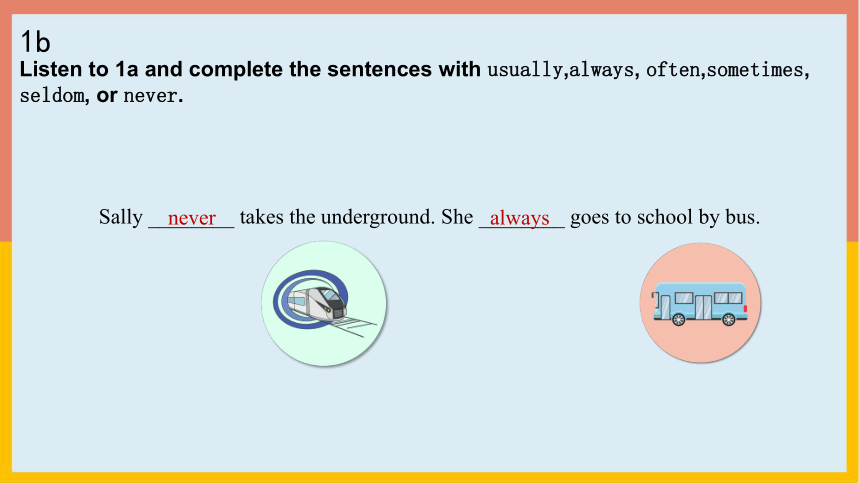
文档简介
(共45张PPT)
Unit 5 Our School Life
Topic 1 I usually come to school by subway.
Section B
How do you usually come to school
How do you usually come to school
I usually come to school by bus.
How do you usually come to school
How do you usually come to school
I usually come to school by bike.
How do you usually come to school
How do you usually come to school
I usually come to school by car.
How do you usually come to school
How do you usually come to school
I usually come to school by subway.
1b
Michael _______ walks to school but ________ goes by bike.
usually
sometimes
Listen to 1a and complete the sentences with usually,always, often,sometimes, seldom, or never.
Helen ______ goes to school on foot. She _____ takes the underground.
often
seldom
1b
Listen to 1a and complete the sentences with usually,always, often,sometimes, seldom, or never.
Sally ________ takes the underground. She ________ goes to school by bus.
never
always
1b
Listen to 1a and complete the sentences with usually,always, often,sometimes, seldom, or never.
0%
100%
never ______
seldom
sometimes ______
often
usually _______
always
Read 1a and fill in the blanks with the correct words from the list in 1b.
1c
频率副词
always总是
usually通常
often经常
sometimes有时
seldom 很少
never 从不
0 %
100 %
90%
70%
50%
20%
0%
Helen: Michael, what time do you usually get up on weekdays
Michael: I always get up at about six o' clock.
Helen: The early bird catches the worm. How do you usually come to school
Michael: I usually come to school on foot, but sometimes by bike. How about you
Helen: I seldom walk to school. I often come by subway.
What about you, Sally
Sally: I never come to school by subway. I always take
a bus.
Look, listen and say.
提问时间,译为“什么时候”
what time=when
get up起床
go to bed睡觉
on/at weekends在周末
早起的鸟儿有虫吃
步行
how about=what about
How about you?那你呢?
1a
Language points 知识点
1.Michael, what time do you usually get up on weekdays 迈克尔,工作日你通常几点起床?
on weekdays意为“在平日,在工作日”。这是习惯表达法,介词只能用on,不能用at
Attention 注意
【注意】weekend(s)前可用介词on,也可以用at,意为“在周末”。
e.g.
I always get up very late on/at weekends.
周末我总是起得很晚
Language points 知识点
2.I always get up at about six o' clock.我总是在六点钟左右起床。
(1)always意为“总是,一直”。
英语中,常见的表示不定时间概念的频度副词还有usually(通常),often(经常),sometimes(有时),seldom(很少),never(从不,从来没有)等。
never“从不”表达否定。always的否定可为never。
e.g.
Thomas always gets up at 6 o’clock托马斯总是六点钟起床
其否定句为:
Thomas never gets up at 6 o’clock托马斯从不六点钟起床
Language points 知识点
2.I always get up at about six o' clock.我总是在六点钟左右起床。
(2)
①about在句中为副词,意为“大约,大概”
e.g.
The man is about thirty years old.这位男士三十岁左右
Link 链接
②about还可以做为介词,意为“关于”
e.g.
a book about music.一本关于音乐的书
Language points 知识点
3.Maria sometimes takes the subway home.玛丽亚有时乘地铁回家
(1)take the subway意为“乘地铁”
一般情况下,乘坐某种交通工具有两种表达方式:
①take a(n)/the+表示交通工具的单数名词
②by+表示交通工具的单数名词
e.g.
take a taxi或by taxi乘出租车
Attention 注意
【注意】前者为动词短语,在句中做谓语;后者为介词短语,在句中常作状语。
e.g.
I usually take a bus to work.=I usually go to work by bus.我通常乘公共汽车去上班
Expansion 拓展
类似的介词短语还有:in/on+a(n)/the/this/one’s/...+表示交通工具的单数名词
e.g.
Tim rides a bike to school.
=Tim goes to school by bike.
=Tim goes to school on his bike.蒂姆骑自行车去上学
Language points 知识点
3.Maria sometimes takes the subway home.玛丽亚有时乘地铁回家
(2)take the subway home意为“乘地铁回家”
此处home为地点副词,因此在home前省略介词to。此外,there,here也是地点副词。
e.g.
·On my way home,I meet Jane.在回家的路上,我遇到了简
·Come here,Kate.凯特,到这里来
·Let’s go there to watch a basketball game.我们去那边看篮球比赛吧
Language points 知识点
4.watch TV in the afternoon.下午看电视
watch动词,意为“观看,注意;当心,注意”,通常用于观看电视、比赛。
e.g.
watch a football game看足球赛
Link 链接
watch还可以做名词,意为“手表”,复数形式加-es
e.g.
Ann has a new watch.安有一块新手表
Language points 知识点
频度副词Adverbs of Frequency
(1)频度副词的概念
指一类表示动作发生次数的副词
Language points 知识点
频度副词Adverbs of Frequency
(2)频度副词在句中的位置
①频度副词通常位于行为动词前,或者be动词、助动词、情态动词后。
e.g.
·Sam seldom comes to see us.山姆很少来看我们
·Miss Wang is always busy.王老师总是很忙
·I don’t often go to the park on Saturdays.星期六我不经常去公园
Language points 知识点
频度副词Adverbs of Frequency
(2)频度副词在句中的位置
②sometimes,usually常用于句首或句末,通常为了强调动作的方式、程度、频率等
e.g.
·Sometimes I go to school on foot.有时候我步行上学
·Usually I get up early.我平时起的很早
·Jack goes to bed very late sometimes.杰克有时候睡得很晚
Language points 知识点
频度副词Adverbs of Frequency
(2)频度副词在句中的位置
③在否定句中,有的频度副词位于否定词之前后均可,如usually;而有的频度副词必须位于否定词后,如:always;还有的频度副词必须位于否定词前,如sometimes
e.g.
·We don’t usually have breakfast on Sundays.星期日我们一般不吃早饭
·Things are not always good.事情不可能总是好的
·Morty is sometimes not satisfied with my work.莫蒂有时对我的工作不满意
How do you usually come to school
I usually come to school by bike.
I usually ride a bike to school.
骑自行车
by bike
ride a bike
骑自行车
by bike
ride a bike
乘小汽车
by car
take a car
乘小汽车
by car
take a car
坐地铁
by subway
take the subway
坐地铁
by subway
take the subway
Study the example to understand the two ways of expressing the same meaning. Then fill in the blanks.
Li Xiang
Li Xiang often comes to school by bike.
Li Xiang often rides a bike to school.
2a
Maria
Maria sometimes takes the subway home.
goes
by subway
Maria sometimes _____ home ____ _______.
Study the example to understand the two ways of expressing the same meaning. Then fill in the blanks.
2a
Study the example to understand the two ways of expressing the same meaning. Then fill in the blanks.
2a
We usually go to the park on foot.
We usually ______ to the park.
walk
Study the example to understand the two ways of expressing the same meaning. Then fill in the blanks.
2a
They always go to the zoo by bus.
They always _____ _____ _____to the zoo.
take a bus
Example:
A: How does Li Xiang go to school
B: He often goes to school by bike./ He often rides a bike to school.
2b
Ask and answer questions about the pictures in 2a with your partner.
3
Listen to the passage about Nancy’s activities and check (√) the correct answers.
Activity Frequency walk to school take a bus to school do her homework in the evening watch TV in the afternoon play soccer on Sundays see a movie
always
usually
often
sometimes
seldom
never
√
√
√
√
√
√
On-the-spot inspection 当堂检测
1. It’s time for breakfast.(同义句转换)It’s time ______ ______ breakfast.2. They go home by subway.(同义句转换)They go home ______ ___________.3. My sister goes to school by train.(对画线部分提问)______ ______ your sister go to school 4. I usually get up at 5 o'clock.(改为一般疑问句)______ ______ usually get up at 5 o’clock 5. —Oh, your schoolbag is very beautiful.(作出回答)—______ ______.
to have
by underground
How does
Do you
Thank you
Unit 5 Our School Life
Topic 1 I usually come to school by subway.
Section B
How do you usually come to school
How do you usually come to school
I usually come to school by bus.
How do you usually come to school
How do you usually come to school
I usually come to school by bike.
How do you usually come to school
How do you usually come to school
I usually come to school by car.
How do you usually come to school
How do you usually come to school
I usually come to school by subway.
1b
Michael _______ walks to school but ________ goes by bike.
usually
sometimes
Listen to 1a and complete the sentences with usually,always, often,sometimes, seldom, or never.
Helen ______ goes to school on foot. She _____ takes the underground.
often
seldom
1b
Listen to 1a and complete the sentences with usually,always, often,sometimes, seldom, or never.
Sally ________ takes the underground. She ________ goes to school by bus.
never
always
1b
Listen to 1a and complete the sentences with usually,always, often,sometimes, seldom, or never.
0%
100%
never ______
seldom
sometimes ______
often
usually _______
always
Read 1a and fill in the blanks with the correct words from the list in 1b.
1c
频率副词
always总是
usually通常
often经常
sometimes有时
seldom 很少
never 从不
0 %
100 %
90%
70%
50%
20%
0%
Helen: Michael, what time do you usually get up on weekdays
Michael: I always get up at about six o' clock.
Helen: The early bird catches the worm. How do you usually come to school
Michael: I usually come to school on foot, but sometimes by bike. How about you
Helen: I seldom walk to school. I often come by subway.
What about you, Sally
Sally: I never come to school by subway. I always take
a bus.
Look, listen and say.
提问时间,译为“什么时候”
what time=when
get up起床
go to bed睡觉
on/at weekends在周末
早起的鸟儿有虫吃
步行
how about=what about
How about you?那你呢?
1a
Language points 知识点
1.Michael, what time do you usually get up on weekdays 迈克尔,工作日你通常几点起床?
on weekdays意为“在平日,在工作日”。这是习惯表达法,介词只能用on,不能用at
Attention 注意
【注意】weekend(s)前可用介词on,也可以用at,意为“在周末”。
e.g.
I always get up very late on/at weekends.
周末我总是起得很晚
Language points 知识点
2.I always get up at about six o' clock.我总是在六点钟左右起床。
(1)always意为“总是,一直”。
英语中,常见的表示不定时间概念的频度副词还有usually(通常),often(经常),sometimes(有时),seldom(很少),never(从不,从来没有)等。
never“从不”表达否定。always的否定可为never。
e.g.
Thomas always gets up at 6 o’clock托马斯总是六点钟起床
其否定句为:
Thomas never gets up at 6 o’clock托马斯从不六点钟起床
Language points 知识点
2.I always get up at about six o' clock.我总是在六点钟左右起床。
(2)
①about在句中为副词,意为“大约,大概”
e.g.
The man is about thirty years old.这位男士三十岁左右
Link 链接
②about还可以做为介词,意为“关于”
e.g.
a book about music.一本关于音乐的书
Language points 知识点
3.Maria sometimes takes the subway home.玛丽亚有时乘地铁回家
(1)take the subway意为“乘地铁”
一般情况下,乘坐某种交通工具有两种表达方式:
①take a(n)/the+表示交通工具的单数名词
②by+表示交通工具的单数名词
e.g.
take a taxi或by taxi乘出租车
Attention 注意
【注意】前者为动词短语,在句中做谓语;后者为介词短语,在句中常作状语。
e.g.
I usually take a bus to work.=I usually go to work by bus.我通常乘公共汽车去上班
Expansion 拓展
类似的介词短语还有:in/on+a(n)/the/this/one’s/...+表示交通工具的单数名词
e.g.
Tim rides a bike to school.
=Tim goes to school by bike.
=Tim goes to school on his bike.蒂姆骑自行车去上学
Language points 知识点
3.Maria sometimes takes the subway home.玛丽亚有时乘地铁回家
(2)take the subway home意为“乘地铁回家”
此处home为地点副词,因此在home前省略介词to。此外,there,here也是地点副词。
e.g.
·On my way home,I meet Jane.在回家的路上,我遇到了简
·Come here,Kate.凯特,到这里来
·Let’s go there to watch a basketball game.我们去那边看篮球比赛吧
Language points 知识点
4.watch TV in the afternoon.下午看电视
watch动词,意为“观看,注意;当心,注意”,通常用于观看电视、比赛。
e.g.
watch a football game看足球赛
Link 链接
watch还可以做名词,意为“手表”,复数形式加-es
e.g.
Ann has a new watch.安有一块新手表
Language points 知识点
频度副词Adverbs of Frequency
(1)频度副词的概念
指一类表示动作发生次数的副词
Language points 知识点
频度副词Adverbs of Frequency
(2)频度副词在句中的位置
①频度副词通常位于行为动词前,或者be动词、助动词、情态动词后。
e.g.
·Sam seldom comes to see us.山姆很少来看我们
·Miss Wang is always busy.王老师总是很忙
·I don’t often go to the park on Saturdays.星期六我不经常去公园
Language points 知识点
频度副词Adverbs of Frequency
(2)频度副词在句中的位置
②sometimes,usually常用于句首或句末,通常为了强调动作的方式、程度、频率等
e.g.
·Sometimes I go to school on foot.有时候我步行上学
·Usually I get up early.我平时起的很早
·Jack goes to bed very late sometimes.杰克有时候睡得很晚
Language points 知识点
频度副词Adverbs of Frequency
(2)频度副词在句中的位置
③在否定句中,有的频度副词位于否定词之前后均可,如usually;而有的频度副词必须位于否定词后,如:always;还有的频度副词必须位于否定词前,如sometimes
e.g.
·We don’t usually have breakfast on Sundays.星期日我们一般不吃早饭
·Things are not always good.事情不可能总是好的
·Morty is sometimes not satisfied with my work.莫蒂有时对我的工作不满意
How do you usually come to school
I usually come to school by bike.
I usually ride a bike to school.
骑自行车
by bike
ride a bike
骑自行车
by bike
ride a bike
乘小汽车
by car
take a car
乘小汽车
by car
take a car
坐地铁
by subway
take the subway
坐地铁
by subway
take the subway
Study the example to understand the two ways of expressing the same meaning. Then fill in the blanks.
Li Xiang
Li Xiang often comes to school by bike.
Li Xiang often rides a bike to school.
2a
Maria
Maria sometimes takes the subway home.
goes
by subway
Maria sometimes _____ home ____ _______.
Study the example to understand the two ways of expressing the same meaning. Then fill in the blanks.
2a
Study the example to understand the two ways of expressing the same meaning. Then fill in the blanks.
2a
We usually go to the park on foot.
We usually ______ to the park.
walk
Study the example to understand the two ways of expressing the same meaning. Then fill in the blanks.
2a
They always go to the zoo by bus.
They always _____ _____ _____to the zoo.
take a bus
Example:
A: How does Li Xiang go to school
B: He often goes to school by bike./ He often rides a bike to school.
2b
Ask and answer questions about the pictures in 2a with your partner.
3
Listen to the passage about Nancy’s activities and check (√) the correct answers.
Activity Frequency walk to school take a bus to school do her homework in the evening watch TV in the afternoon play soccer on Sundays see a movie
always
usually
often
sometimes
seldom
never
√
√
√
√
√
√
On-the-spot inspection 当堂检测
1. It’s time for breakfast.(同义句转换)It’s time ______ ______ breakfast.2. They go home by subway.(同义句转换)They go home ______ ___________.3. My sister goes to school by train.(对画线部分提问)______ ______ your sister go to school 4. I usually get up at 5 o'clock.(改为一般疑问句)______ ______ usually get up at 5 o’clock 5. —Oh, your schoolbag is very beautiful.(作出回答)—______ ______.
to have
by underground
How does
Do you
Thank you
同课章节目录
- Unit 5 Our school life
- Topic 1 I usually come to school by subway.
- Topic 2 A few students are running around the play
- Topic 3 My school life is very interesting.
- Unit 6 Our local area
- Topic 1 Is there a computer in your study?
- Topic 2 My home is in an apartment building.
- Topic 3 Which is the way to the hospital?
- Review of Units 5-6
- Unit 7 The Birthday
- Topic 1 When is your birthday?
- Topic 2 Can you sing an English song?
- Topic 3 Everyone had a good time.
- Unit 8 The seasons and the Weathe
- Topic 1 What's the weather like in summer?
- Topic 2 The summer holidays are coming.
- Topic 3 Let’s celebrate!
- Review of Units 7-8
- 旧版资料
- Unit 5 Our School Life
- Unit 6 Our Local Area
- Unit 7 The Birthday
- Unit 8 The seasons and the Weathe
- Unit 7 Celebrating the Birthday(老版本)
